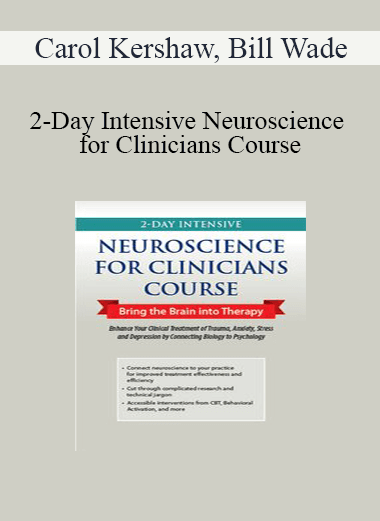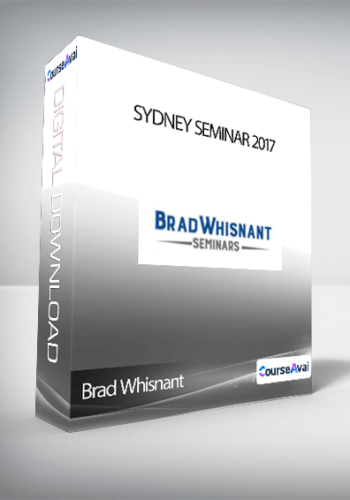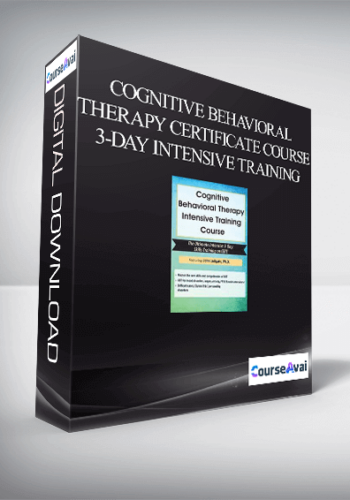Carol Kershaw, Bill Wade – 2-Day Intensive Neuroscience for Clinicians Course: Bring the Brain into Therapy
Original price was: $439.99.$74.70Current price is: $74.70.
[Instant Download] – Immediately deliver the download link after receiving the payment
Description
Unlock your potential with the Unlock your potential with the Carol Kershaw, Bill Wade – 2-Day Intensive Neuroscience for Clinicians Course: Bring the Brain into TherapyCarol Kershaw, Bill Wade – 2-Day Intensive Neuroscience for Clinicians Course: Bring the Brain into Therapy course for only course for only Original price was: $439.99.Original price was: $439.99.$$74.7074.70Current price is: $74.70.Current price is: $74.70. at at Giolib.comGiolib.com! Explore our comprehensive library of over 60,000 downloadable digital courses across various ! Explore our comprehensive library of over 60,000 downloadable digital courses across various Medical & HealthMedical & Health. Get expert-led, self-paced learning at up to 80% savings. Elevate your skills today!. Get expert-led, self-paced learning at up to 80% savings. Elevate your skills today!
- Faculty:Faculty:
- Carol Kershaw | Bill WadeCarol Kershaw | Bill Wade
- Duration:Duration:
- 12 Hours 13 Minutes12 Hours 13 Minutes
- Format:Format:
- Audio and VideoAudio and Video
- Copyright:Copyright:
- Nov 08, 2018Nov 08, 2018
Description
Outline
Motivate and Engage Your Clients with NeuroscienceMotivate and Engage Your Clients with Neuroscience
- Simple explanations on brain structure and functionSimple explanations on brain structure and function
- The neurobiology of specific disordersThe neurobiology of specific disorders
- You can change – neuroplasticity and the potential for transformationYou can change – neuroplasticity and the potential for transformation
Teach Clients About Brain HealthTeach Clients About Brain Health
- Sleep quality and moodSleep quality and mood
- NutritionNutrition
- The habit of exerciseThe habit of exercise
- The value of social supportThe value of social support
- Detrimental impacts of stressDetrimental impacts of stress
How the Neurobiology of Attachment and Relationships Informs Your Clinical PracticeHow the Neurobiology of Attachment and Relationships Informs Your Clinical Practice
- Neurobiological basis of attachmentNeurobiological basis of attachment
- How relationships impact our brainsHow relationships impact our brains
- Mirror neurons, empathy and connecting with othersMirror neurons, empathy and connecting with others
- Oxytocin and the individual selfOxytocin and the individual self
- How attachment style impacts your clients’ relationshipsHow attachment style impacts your clients’ relationships
- Attachment and attunement in the therapeutic relationshipAttachment and attunement in the therapeutic relationship
Trauma: Trauma: Connect the Neurobiology of Trauma to TreatmentConnect the Neurobiology of Trauma to Treatment
- Childhood trauma and the trajectory of brain developmentChildhood trauma and the trajectory of brain development
- The fight/flight/freeze responseThe fight/flight/freeze response
- Implicit memory and the limbic systemImplicit memory and the limbic system
- Clinical techniques:
Clinical techniques:
- Trigger identificationTrigger identification
- ExposureExposure
- Guided imageryGuided imagery
- Grounding strategiesGrounding strategies
Anxiety and Stress: Anxiety and Stress: Regulate Emotion and Interrupt Anxious RuminationRegulate Emotion and Interrupt Anxious Rumination
- How the brain is organized – and how it organizesHow the brain is organized – and how it organizes
- Homeostasis, stress pathways and stress responsesHomeostasis, stress pathways and stress responses
- The resting state – the parasympathetic nervous system and mental healthThe resting state – the parasympathetic nervous system and mental health
- Emotional and thinking circuits, and perception of control – and why this matters to therapyEmotional and thinking circuits, and perception of control – and why this matters to therapy
- Clinical techniques:
Clinical techniques:
- Mindful awareness of emotions – labeling emotionsMindful awareness of emotions – labeling emotions
- Interventions that shift focus away from anxious ruminationInterventions that shift focus away from anxious rumination
- Interrupt worry patterns with physical exerciseInterrupt worry patterns with physical exercise
- Diaphragmatic breathing exercises to regulate emotionDiaphragmatic breathing exercises to regulate emotion
- Resiliency – susceptibility to stress-based damageResiliency – susceptibility to stress-based damage
Depression: Depression: Techniques to Intervene in the Downward SpiralTechniques to Intervene in the Downward Spiral
- The limitations of medication-based treatmentThe limitations of medication-based treatment
- Brain circuits involved in positive and negative emotionBrain circuits involved in positive and negative emotion
- The brain’s negativity bias and depression riskThe brain’s negativity bias and depression risk
- The amygdala in the depressed brainThe amygdala in the depressed brain
- The downward spiralThe downward spiral
- Reconstructed memoriesReconstructed memories
- Clinical techniques:
Clinical techniques:
- Behavioral Activation – get out of your head and into your lifeBehavioral Activation – get out of your head and into your life
- Cognitive therapy tools – problem solving skills in the treatment planCognitive therapy tools – problem solving skills in the treatment plan
- The psychology of obtainable goalsThe psychology of obtainable goals
- Self-compassion as a buffer to depressive symptomsSelf-compassion as a buffer to depressive symptoms
Neurocognitive Health CheckupNeurocognitive Health Checkup
- Test of Variable Attention (TOVA)Test of Variable Attention (TOVA)
- Mood evaluationMood evaluation
- Biochemical dysfunction and depressionBiochemical dysfunction and depression
- Measuring memoryMeasuring memory
- Brain injuryBrain injury
- NeurofeedbackNeurofeedback
Simple Biofeedback Tools for Regulating Physiological ResponsesSimple Biofeedback Tools for Regulating Physiological Responses
- Physiological control and psychologyPhysiological control and psychology
- Biofeedback gamesBiofeedback games
- Controlled breathingControlled breathing
- Heart Rate VariabilityHeart Rate Variability
- EEG biofeedback trainingEEG biofeedback training
Distractibility and the Brain: Distractibility and the Brain: Cognitive Costs in the Land of Information OverloadCognitive Costs in the Land of Information Overload
- The myth of multitasking – Multitasking vs. task switchingThe myth of multitasking – Multitasking vs. task switching
- Synaptic pathways, mental states, memory and learningSynaptic pathways, mental states, memory and learning
- The pre-frontal cortex and flexible goal directed behaviorThe pre-frontal cortex and flexible goal directed behavior
- Teach clients coping strategies that can:
Teach clients coping strategies that can:
- Reshape detrimental behavioral patternsReshape detrimental behavioral patterns
- Decrease distractionsDecrease distractions
- Build organizational and time management skillsBuild organizational and time management skills
The Neuroscience of Positive PsychologyThe Neuroscience of Positive Psychology
- The science behind gratitude
The science behind gratitude
- Overcome barriers to practicing gratitudeOvercome barriers to practicing gratitude
- Easy-to-use gratitude exercisesEasy-to-use gratitude exercises
- The neuroanatomy of forgivenessThe neuroanatomy of forgiveness
- Strengths-based interventionsStrengths-based interventions
- Flow states
Flow states
- Merge action with awarenessMerge action with awareness
- Flow, the prefrontal cortex, and the inner criticFlow, the prefrontal cortex, and the inner critic
- Research limitations of positive psychology approachesResearch limitations of positive psychology approaches
The Limitations of Neuroscientific Research and Potential RisksThe Limitations of Neuroscientific Research and Potential Risks
- fMRI imagingfMRI imaging
- Things to keep in mind regarding animal studiesThings to keep in mind regarding animal studies
- Simple explanations for complicated processesSimple explanations for complicated processes
- Research limitations, and treatment risksResearch limitations, and treatment risks
Faculty
Carol Kershaw, Ed.D. Related seminars and products: 5
Carol Kershaw, Ed.D., Carol Kershaw, Ed.D., is a licensed psychologist and co-director of the Milton Erickson Institute of Houston and co-author of Brain Change Therapy: Clinical Interventions for Self Transformation (2012 WW Norton), co-author of The Worry Free Mind (Career Press) and author of The Couple’s Hypnotic Dance (Brunner/Mazel). She is board certified in Neurofeedback, a member of the American Psychological Association, and approved consultant for the American Society of Clinical Hypnosis. She is an international trainer and is a frequent presenter in the states on the most cutting edge interventions based in neuroscience and hypnosis. Carol has been featured on ABC, CBS, Fox and NBC for her cutting-edge work.is a licensed psychologist and co-director of the Milton Erickson Institute of Houston and co-author of Brain Change Therapy: Clinical Interventions for Self Transformation (2012 WW Norton), co-author of The Worry Free Mind (Career Press) and author of The Couple’s Hypnotic Dance (Brunner/Mazel). She is board certified in Neurofeedback, a member of the American Psychological Association, and approved consultant for the American Society of Clinical Hypnosis. She is an international trainer and is a frequent presenter in the states on the most cutting edge interventions based in neuroscience and hypnosis. Carol has been featured on ABC, CBS, Fox and NBC for her cutting-edge work.
Speaker Disclosure:Speaker Disclosure:
Financial: Carol Kershaw receives royalties as an author for W.W. Norton and Company. She receives a speaking honorarium from PESI, Inc.Financial: Carol Kershaw receives royalties as an author for W.W. Norton and Company. She receives a speaking honorarium from PESI, Inc.
Non-financial: Carol Kershaw has no relevant non-financial relationship to disclose.Non-financial: Carol Kershaw has no relevant non-financial relationship to disclose.
Bill Wade Related seminars and products: 3
Bill Wade, M.Div., LPC, LMFTBill Wade, M.Div., LPC, LMFT is a licensed professional counselor and marriage and family therapist, author and international trainer. Co-director of the Milton Erickson Institute of Houston he is also a co-author of is a licensed professional counselor and marriage and family therapist, author and international trainer. Co-director of the Milton Erickson Institute of Houston he is also a co-author of Brain Change Therapy: Clinical Interventions for Self-TransformationBrain Change Therapy: Clinical Interventions for Self-Transformation and and The Worry Free Mind: Train Your Brain, Calm The Stress Spin Cycle, and Discover a Happier, More Productive YouThe Worry Free Mind: Train Your Brain, Calm The Stress Spin Cycle, and Discover a Happier, More Productive You. Bill has taught extensively in the states on neuroscience and has also taught meditation and given Dharma lectures at various Buddhist temples.. Bill has taught extensively in the states on neuroscience and has also taught meditation and given Dharma lectures at various Buddhist temples.
Speaker Disclosure:Speaker Disclosure:
Financial: J. William Wade maintains a private practice. He receives royalties from W.W. Norton, Amazon Books and CDS. He receives a speaking honorarium from PESI, Inc.Financial: J. William Wade maintains a private practice. He receives royalties from W.W. Norton, Amazon Books and CDS. He receives a speaking honorarium from PESI, Inc.
Non-financial: J. William Wade is a member of the American Association for Marriage and Family Therapy; American Counseling Association; and Texas Association for Marriage and Family Therapy.Non-financial: J. William Wade is a member of the American Association for Marriage and Family Therapy; American Counseling Association; and Texas Association for Marriage and Family Therapy.
Future-proof your knowledge with the Future-proof your knowledge with the Carol Kershaw, Bill Wade – 2-Day Intensive Neuroscience for Clinicians Course: Bring the Brain into TherapyCarol Kershaw, Bill Wade – 2-Day Intensive Neuroscience for Clinicians Course: Bring the Brain into Therapy course at course at GiOlibGiOlib! Enjoy lifetime access to high-quality digital content, crafted to advance your career and personal development.! Enjoy lifetime access to high-quality digital content, crafted to advance your career and personal development.
- Lifetime Access:Lifetime Access: Permanent access to all purchased courses. Permanent access to all purchased courses.
- Smart Savings:Smart Savings: Benefit from prices up to 80% off original course costs. Benefit from prices up to 80% off original course costs.
- Safe Transactions:Safe Transactions: Process your payments securely. Process your payments securely.
- Practical Insights:Practical Insights: Gain actionable skills relevant to today's demands. Gain actionable skills relevant to today's demands.
- Instant Availability:Instant Availability: Begin your course immediately after payment. Begin your course immediately after payment.
- Flexible Learning:Flexible Learning: Access content effortlessly on any device. Access content effortlessly on any device.
Start expanding your horizons with Start expanding your horizons with GiOlibGiOlib!!





